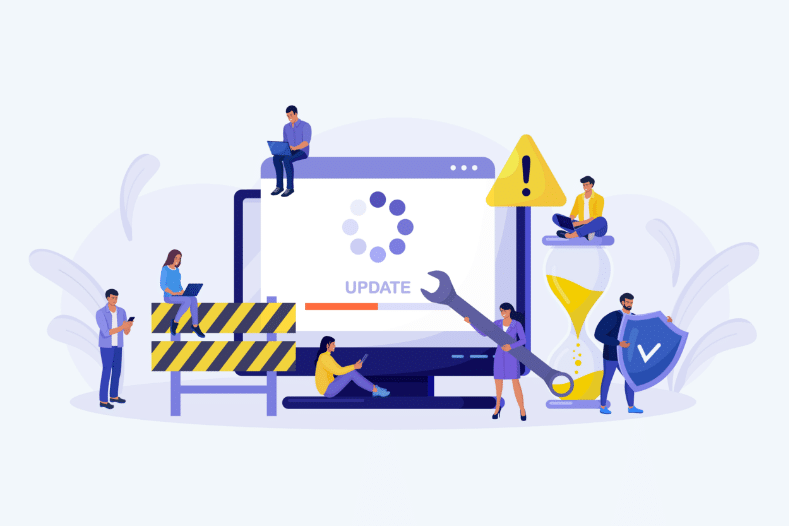How can regular website maintenance keep your site secure and SEO-friendly
(Part II)
As promised, we’re back with part II – all things website maintenance and why you need it. As previously mentioned, a neglected website is like a ship with a leak—it’s going down, and it’s going down fast. At the same time, security breaches, slow load times, and other digital pitfalls can hurt your website’s ranking on search engines, and we don’t want that, right? So now, in this blog, let’s see a few more reasons why you need to keep your website in tip-top shape by scheduling regular maintenance. (If you still haven’t read our web maintenance blog part I, you may find it here.)
-
 Chrisa
Chrisa
-
 Chrisa
Chrisa

Website Maintenance Essentials – Round 2
Let’s pick up where we left off…shall we? So, how can each aspect of website maintenance affect your business? Let’s explain everything while exploring some real-life scenarios:

Domain Expiry
If you run a business website, you have to keep track of your domain’s expiry date. Each domain name has its own start and end dates. You can usually register a domain for 1 to 10 years and, if needed, renew it while it’s still active or reactivate it after it expires. If it expires without you realizing it, your website will go offline, and your customers won’t be able to make purchases, which will obviously lead to lost sales, unhappy customers, and damage to your brand’s reputation.
Fun fact, even big companies like Microsoft and Foursquare have accidentally let their domains expire, causing a loss of business and damage to their brand. To avoid this, the best solution is to have constant monitoring and maintenance services that prevent accidental domain expiration without forcing you to renew domains you no longer need. Reminder here, as part of our services (if needed), we can keep track of domains not owned by you and purchase them when the registration expires and the domain is out of the grace period.
➡️ Addressing Common Questions: Why is my website not ranking after a domain name change?
Website Speed/Performance
A faster website with fewer frustrations improves user experience, which in turn results in lower bounce rates and higher conversions, ultimately helping your bottom-line business results – even outside of economic reasons. Now, slow website speed can lead to a poor user experience, resulting in decreased traffic and engagement on your website. In fact, did you know that a 1-second delay in page load time can lead to a 7% decrease in conversions?
Food for thought. Additionally, in 2020, Google came up with something called Core Web Vitals, which is a set of requirements that determine how your website ranks. One of the most important factors there, and the reason why we mention it here, is user experience – to put it simply, website maintenance has become more focused on making sure users have a great experience, including faster load times. So, in maintenance, it’s a good idea to keep an eye on your website’s loading time regularly so that you can catch any problems and fix them quickly – ideally, we’d suggest checking every few weeks to stay on top of things.
Mobile Responsiveness
Having a great website is all about delivering what users want, and when and where they want it and one of the main reasons why you need to check your mobile responsiveness during website maintenance is that more than 50% of website traffic comes from mobile devices, which means that a significant portion of your website visitors are likely accessing your site through their phones or tablets.
If your website isn’t mobile-responsive, it can lead to a poor user experience for your mobile visitors, which can result in a high bounce rate, low engagement, and fewer conversions. This is also why you need to ensure that your website is mobile-friendly and responsive during maintenance. By doing so, you can improve your website’s user experience, increase engagement, and ultimately boost your conversions. Plus, it shows that you care about your visitors and their experience on your website.
➡️ Addressing Common Questions: Why having a good UX website matters?
Browser Compatibility
Did you know that different web browsers interpret websites differently? So, your website may look great on one browser, let’s say Google, but not on another, let’s say Safari. This can be a problem because it can lead to inconsistencies in user experience, which can drive visitors away from your website, and nobody wants that, right?
By checking your website’s compatibility on different browsers regularly, you can ensure that your visitors have a consistent and positive experience on your website, no matter what browser they use. It’s like making sure that your house looks good from all angles, not just the front.
Broken Links
Keeping an eye on your website’s SEO during maintenance is like giving it a tune-up to attract more visitors organically. Websites that are frequently updated with fresh and relevant content are ranked higher by Google, while similarly, removing old and outdated content is just as important as adding new content, as it shows Google that you’re committed to maintaining your website. When you optimize your content, meta tags, and images, you’re essentially sprucing up your site to draw in more traffic. For instance, if you’re a local business, using local keywords can reel in customers from your area.
Regularly checking your SEO also lets you stay one step ahead of competitors, bringing more eyes to your site. Last but not least, analyzing how your site performs can help you pinpoint areas to enhance, like tweaking content or structure, to help it climb higher in search engine rankings. It’s all about fine-tuning to make sure your website gets better and better.
➡️ But remember that SEO is a continuous process, so you need to regularly check and assess keywords, update content, refresh backend data, and check links.
SEO Monitoring
According to a report by Forrester Research, a well-designed user interface could raise your website’s conversion rate by up to 200%. And that’s a significant increase! The key is a continual evaluation and improvement of the overall user experience. This process might include tweaking design elements, refining navigation, and integrating user feedback to boost usability.
Crafting a website user experience roadmap is a great way to outline and shape the journey for visitors, especially those encountering your site for the first time. This strategic approach ensures that your website is not just a digital space, but a welcoming and intuitive environment for every user.
Let’s see this in a real-life context once again – imagine you run a travel website, and your primary goal is to get visitors to book a trip. You may want to focus on improving the booking process and making it as user-friendly as possible. This could include adding a progress bar to show users where they are in the booking process or simplifying the checkout process to reduce the steps involved. By focusing on UX enhancements, you can improve your website’s usability, reduce bounce rates, and increase conversions. It’s a win-win situation for both you and your visitors.
➡️ Read More: UX Optimization: Understanding how people use your website
Conclusion
In summary, website maintenance is a must if you wanna ensure a smooth and positive user experience for your visitors. Neglecting your website can result in lost sales, decreased customer satisfaction, and long-term damage to your brand’s reputation. In contrast, by regularly checking your website’s speed, mobile responsiveness, browser compatibility, broken links, SEO, and domain expiry, you can ensure that your website is always in top shape, attracting more visitors and, ultimately, more business.
Website Maintenance FAQs
1. Why is website maintenance important?
Website maintenance ensures that your website remains live, up-to-date, and error-free. It involves regular checks for security vulnerabilities, content updates, and technical optimizations to provide a seamless user experience.
2. What does website maintenance include?
Website maintenance encompasses various tasks such as updating software, monitoring loading times, ensuring accessibility, checking content quality, and optimizing for search engines. It also involves addressing security concerns and implementing design enhancements.
3. How does fresh content benefit my website?
Fresh content attracts and engages visitors, improving user experience and increasing your site’s visibility on search engines. By regularly updating content with new products, blog posts, and announcements, you can keep users informed and interested in your brand.
4. How often should I review my website?
The frequency of website reviews depends on the type of updates needed. Some tasks, like software updates, may require monthly checks, while others, like accessibility reviews, can be done every few months. Regular monitoring ensures your website remains functional and optimized.
5. Can I manage website maintenance on my own?
While some website maintenance tasks can be handled independently, others may require technical expertise. Consider outsourcing to a reputable website maintenance company for comprehensive support, ensuring your site receives regular updates and improvements for optimal performance.
6. What role does SEO play in website maintenance?
SEO (Search Engine Optimization) is crucial for website visibility and ranking on search engines like Google. Regular SEO checks and updates ensure that your website remains optimized for relevant keywords, driving organic traffic and improving overall performance.
7. How does website responsiveness impact user experience?
A responsive website adapts seamlessly to different devices and screen sizes, providing an optimal viewing experience for users. By prioritizing responsiveness in website maintenance, you can enhance usability, reduce bounce rates, and attract more visitors across various platforms.
8. What are the benefits of outsourcing website maintenance?
Outsourcing website maintenance to a professional company ensures consistent monitoring, timely updates, and expert support for your website. By entrusting maintenance tasks to skilled professionals, you can focus on core business activities while ensuring your website remains secure, functional, and user-friendly.
Why not try our free website checkup?
Now that we’ve said it all, a tailored website checkup is just a click away! At The Roadmap, we analyze your website’s performance, provide a detailed report, and offer personalized services to enhance your visibility on Google. With a tailored to your niche marketing roadmap, we ensure we head in the right direction, capturing more and more attention online. Time to request your free checkup and see which digital foundations you first need to invest in.




